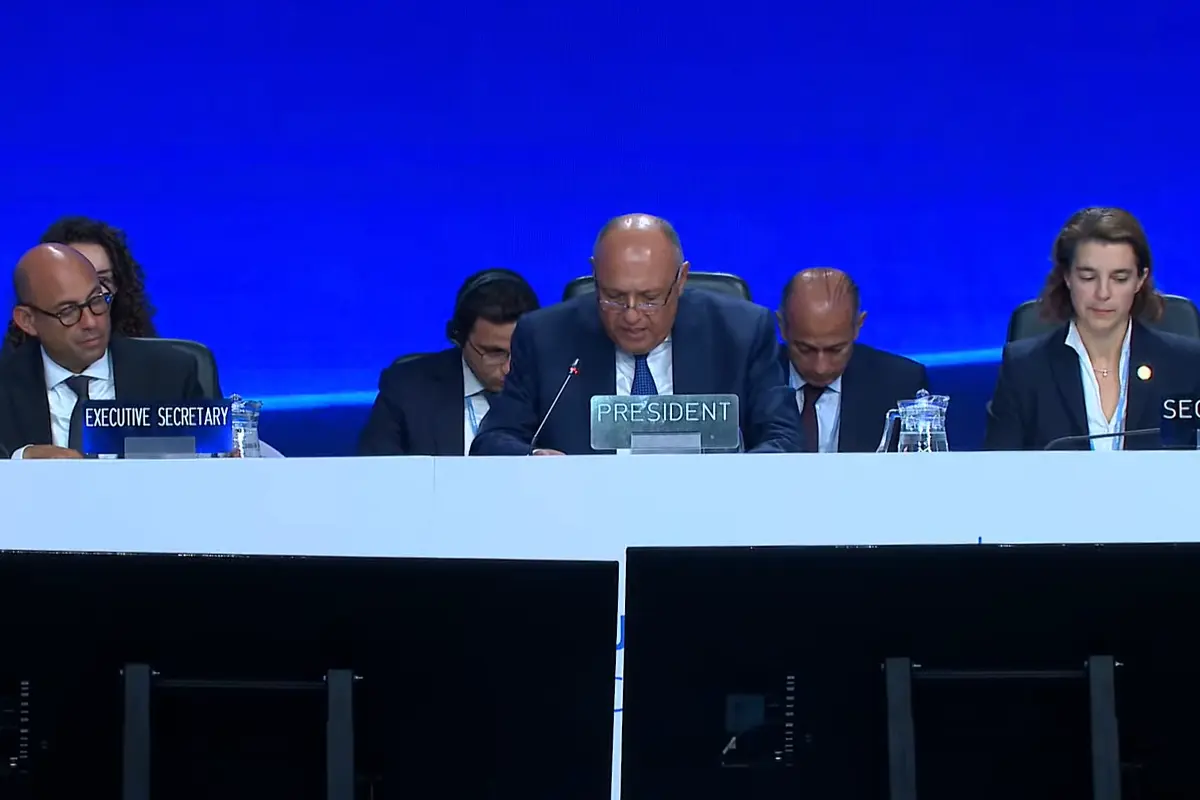The push-back on loss and damage and climate action from wealthy nations shows that Global North leaders still don’t recognize their role in the climate crisis
What is COP27?
Between Sunday, November 6, and Friday, November 19, 2022, the 27th Conference of the Parties of the UNFCCC (COP27) took place in The El Sheikh International Convention Centre (SHICC), El Salam Road, in Sharm El Sheikh, Egypt.
These Conference of the Parties (COP) are yearly office meetings of the United Nations Framework Convention on Climate Change (UNFCCC) parties held within the UNFCCC framework. The first COP was held in Berlin, Germany, in March 1995.
COP 27 was scheduled for November 2021, but it was moved to 2022 because of the Glasgow COP26 rescheduling from 2020 to 2021.
Who participated in COP27?
As it is the supreme decision-making body of the Convention, at COP, all states that are Parties to the United Nations Framework Convention on Climate Change are represented.
Representatives of the Parties to the Convention and observer states attended this year’s COP, with 196 nations attending. Members of the press and public and representatives of observer organizations such as the UN System and its specialized agencies and admitted IGOs, and NGOs were in attendance.
What were its goals?
The Parties submit national communications and emission inventories reviewed during COP, allowing for an assessment of the measures’ effectiveness in moving towards the Convention’s goal. Building on the work done in Stockholm, Rio, Bali, Kyoto, Durban, Paris, Katowice, and Glasgow, Egypt’s COP27 presidency’s declared goal was to harmonize global efforts.
Another objective is to move from negotiations and planning to actual implementation with speedy and inclusive action on the ground to meet pledges and commitments and address the climate crisis. Egypt’s COP27 presidency highlighted the need for progress in mitigation, adaptation, finance, and loss and damage.
The progress needed after COP26
Loss and damage is an expression that refers to the environmental harm caused by increased global temperatures due to anthropogenic greenhouse gas emissions (GHG) emitted since the industrial revolution.
At COP26 in Glasgow, the Parties agreed that the Santiago Network, established in the review of the WIM at COP25, would be provided with finance to support technical assistance for the implementation of relevant approaches to avert, minimize and address loss and damage in countries vulnerable to the adverse effects of climate change.
This outcome on the issue, with its sole focus on funding technical assistance, is far from what is needed to mobilize the necessary finance. Further progress was blocked by the push-back from wealthy nations, which at COP26, opposed the founding of the Glasgow Loss and Damage Facility. The Glasgow Dialogue, a weak compromise, was established for Parties and non-party stakeholders to discuss the funding arrangements to address loss and damage.
Controversies and limitations
The geopolitical landscape
COP27 occurred in a time characterized by a conflict-ridden geopolitical landscape with the Russian invasion of Ukraine, the consequential energy crisis, and a cost of livingcost-of-living crisis affecting millions of people already impacted by the COVID-19 pandemic.
Differences and fractions are usual in this context, and the relationships between two major emitters, the United States and China, have been tense. Swedish climate activist Greta Thunberg, who has not been in attendance at COP27, defined the COP conferences as opportunities for the powerful to engage in greenwashing and highlighted their potential role as an opportunity to mobilize.
The involvement of Coca Cola
There are reasons to believe that COP27 is turning a blind eye to greenwashing. Coca-Cola is among the conference’s supporters. According to the 2021 Brand Audit Report by Break Free From Plastic, in 2021, Coca-Cola was the world’s number one top plastic polluter for the fourth year in a row.
Human rights violations in Egypt
Thunberg hasn’t been the sole activist to voice concerns going into Cop27. Ahead of COP27, twelve Egyptian human rights organizations launched a petition urging Egypt to open civic space and release political prisoners.
Three hundred twenty-one organizations and groups supported the petition, including 350.org, Amnesty International, Fridays for Future, Friends of the Earth International, and 1080 individuals from over eighty countries endorsed the petition.
While the exact number of political prisoners in Egypt is unknown, Human Rights First cited an estimated figure of around 65,000 political prisoners in a 2019 report on torture in the Egyptian detention system.
The influence of the fossil fuel industry
The growing presence of fossil fuel industry lobbyists at COP 27 has attracted criticism, as fossil fuels are the most significant cause of climate change. According to the non-profit organization, over twenty-five percent, more fossil fuel lobbyists were at COP 27 than at the previous COP, as 636 lobbyists registered at the conference. This year at COP, more fossil fuel lobbyists registered than representatives of the ten nations most affected by climate change between 2000 and 2019, according to GermanWatch.
What happened during COP27?
The new presidency
At COP27’s Opening Ceremony, COP26 president Alok Sharma spoke about the progress in implementing the COP 26 commitments, touching on the related criticism. During the same sessions, the President’s election of the Conference of the Parties at its 27th session took place.
In the Opening Speech at the UN Climate Change Conference COP27, President Sameh Shoukry discussed how climate change is a real threat to people’s lives and how science has proved that the development track endorsed since the Industrial Revolution and until recently is no longer sustainable. In addition, Shoukry talked about the polarization of climate-related efforts and pointed out that the $100 billion a year pledge has not yet been implemented.
UN Climate Change Executive Secretary Simon Stiell’s opening speech at the UN Climate Change Conference talked about the NDC synthesis report, according to which twenty-nine out of 194 countries had come forward with tightened national plans since COP 26.
A call for climate compensation
Leaders from frontline nations vulnerable to climate change have asked for climate crisis damage compensation from the wealthy countries that caused global warming. According to the report ‘Global climate risk index 2021’ conducted by Germanwatch, Mozambique, Zimbabwe, and the Bahamas were the most affected countries by climate change-related extreme weather events in 2019.
The Bahamas’ Prime Minister, Philip Brave Davis, spoke at COP27, where the PM stated that big, ambitious goals are important, but not if aspirations are used to obscure reality. Davis added that statements without binding commitments or enforcement mechanisms had been used again and again, as a way to postpone real action.
In the speech, Davis stressed how to address the systemic risk of climate change, multilateral banks must play a crucial role in scaling up financing options that will provide real solutions.
Revisiting Bretton Woods
Mia Mottley, Prime Minister of Barbados, made a speech at the Opening of the COP27 World Leaders Summit of the United Nations Climate Change Conference (COP27). In it, the PM remarked how the Global South remains at the mercy of the Global North on climate issues, which borrows at interest rates of between one to four percent, while the Global South at fourteen.
Mottley called for a reform of the IMF and the World Bank in line with the 2022 Bridgetown Initiative, a plan of action created by international experts congregated at the invitation of the Barbadian Government on the island country. This plan entails the provision of liquidity to stop the debt crisis, expanding multilateral lending to governments by one trillion US dollars, and activating private sector savings for climate mitigation and fund reconstruction after climate disasters via new multilateral mechanisms.
Russia’s event at COP27
The lack of discussion of Russia’s oil and gas production marked the nation’s event at COP27. The protester who shouted, «you are war criminals», was removed from the room. The same happened to journalist Justin Rowlatt, climate editor at BBC, who was removed from the room after asking: «Are you going to pay for the environmental damage you have caused in Ukraine?».
What has been signed during COP27?
Commission President Ursula von der Leyen and President of Namibia Hage Geingob signed a Memorandum of Understanding establishing a strategic partnership on raw materials and hydrogen between the EU and Namibia at the COP27 in Egypt. The EU and Namibia have committed to developing an operational Roadmap for 2023-2024. The European Investment Bank (EIB) and Namibia will work towards implementing a loan by EIB Global to the Government of Namibia of up to 500 million Euros.
Three big rainforest nations, Brazil, Indonesia, and the Democratic Republic of Congo, formed an alliance targeting deforestation. At COP27, Commission President Ursula von der Leyen and the Prime Minister of Kazakhstan Alikhan Smailov established a partnership between the European Union and Kazakhstan on raw materials, batteries, and hydrogen.
Reaching an agreement
In the last days at COP27, as a draft with an agreement for long-term climate finance emerged, there were concerns of countries backsliding on their commitments after slow negotiations fraught divisions.
The talks which were supposed to end on Friday, November 18, 2022 have been extended to Saturday, November 19, 2022. The reason for this delay have been the disagreements on the loss and damage fund which would provide financial assistance to poorer countries hit by climate disasters.
After the delay, the parties reached an agreement on the matter and committed to setting up a financial support structure for the most vulnerable countries by COP28. In addition, the countries reached agreement on the mitigation work programme and the post-2025 finance goal.
While the deal includes this victory made possible by activists from vulnerable nations, the parties failed at moving forward on the phasing out of fossil fuels and the weak language on the necessity to limit global warming to one-point-five degrees Celsius is concerning.
UNFCCC
The United Nations Framework Convention on Climate Change (UNFCCC) is a multilateral environmental agreement signed at the UNCED in Rio de Janeiro in 1992.




















